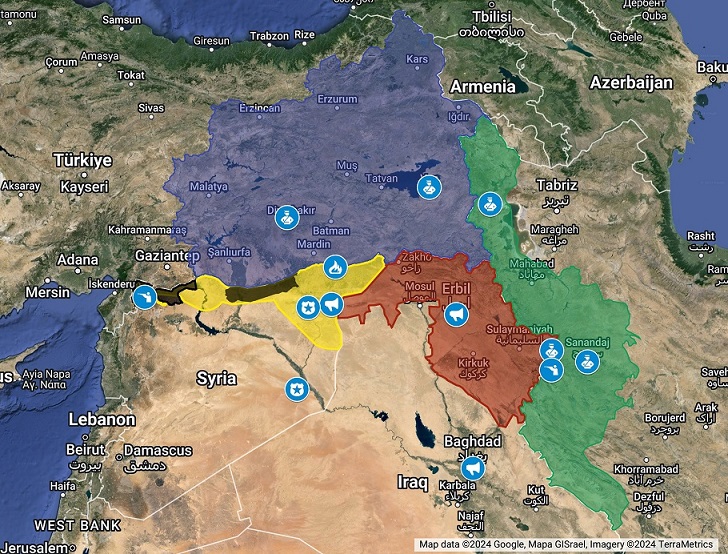1.3K
A weekly brief of events occurred in the Kurdistan regions of Iran, Iraq, Syria, and Turkey.
Iran
- Iranian border guards wounded twenty Kurdish border porters (kolbars) in Nowsud on Saturday. The Hengaw Organization for Human Rights reported Iranian authorities also seized the kolbars’ cargo and that the wounded kolbars were transported to a hospital in Pawa. Concurrently, the regime arrested a Kurdish activist named Dana Lanjawi in Marivan and two Kurdish civilians, Ako Mohammedonia and Zana Minbari, in Senna. The regime also seized the home of an exiled female Kurdish activist named Shyada Rahimi’s spouse. Additionally, Salmas’s Islamic Revolutionary Court sentenced a former protester named Shahin Wasaf to death for “espionage for Israel.” Another Islamic Revolutionary Court in Razavi Khorasan Province sentenced a 65-year-old Kurdish man to 15 years in prison for protesting the death of civilians.
- On Tuesday, the US Treasury Department, in coordination with the United Kingdom, announced fresh sanctions against Mohammad Reza Falahzadeh, the Deputy Commander of the Islamic Revolutionary Guards Corps (IRGC), and a member of Yemen’s Houthi group. In a press release, the Treasury Department stated that the sanctions are intended to “target efforts” by the IRGC’s Quds Forces in evading US sanctions and participating in attacks in the region.
Iraq
- Iraq’s Federal Supreme Court ruled several Kurdistan Regional Government (KRG) election laws were unconstitutional, which, among other things, dissolved the 11 seats reserved for Christian and Turkmen components in the Kurdistan Parliament. Representatives from Iraqi Kurdistan’s Christian and Turkmen parties denounced the ruling and claimed it was discriminatory. The Federal Supreme Court also ruled Baghdad must directly pay the salaries of public employees in Iraqi Kurdistan via Iraq’s central banks, which effectively limits the KRG’s ability to govern the region. Iraqi officials reached out to the KRG for a list of public employees in Iraqi Kurdistan so the Iraqi government could produce and issue electronic cards that would allow the employees to receive payments, but the process is likely to take months. Meanwhile, U.S. Secretary of State Antony Blinken met with a KRG delegation that was led by Prime Minister of Kurdistan Region Masrour Barzani and included the Minister of Peshmerga Affairs on Monday in Washington, D.C. “Our support for a resilient KRG is integral to our 360-degree approach to Iraq. And so the opportunity today to reaffirm this support, reaffirm this partnership and the work that we’re doing together I think is important and timely,” said Secretary Blinken. Barzani expressed his support for the U.S.-Kurdistan partnership and said, “We are very proud to say that we are American allies.” The KRG also released a statement that emphasized the U.S. and the KRG agree the Federal Supreme Court’s recent rulings are worrying and that Iraqi Kurdistan’s place in Iraq’s federal system must be respected.
Syria
- The Syrian Democratic Forces (SDF) reported the arrest of sixteen ISIS (Da’esh) terrorists on February 25 in Hasakah. The detainees are allegedly involved in attacks against the SDF or provided logistical support to the terrorist organization. Earlier in the week, the SDF, with support from the US-led coalition, arrested a senior Da’esh terrorist named Hussien al Hussein. Meanwhile, the US Central Command (CENTCOM) disclosed the repatriation of “99 women and children” displaced people from al Hol and Roj camps to the Kyrgyz Republic. Both camps still house numerous Da’esh families following the defeat of the “caliphate” in 2019. In Qamishli, an office of the Syrian Democratic Council (SDC) was targeted with a bomb, resulting in no casualties. The SDC accused the attackers of attempting to “undermine” the SDC’s position in promoting dialogue.
- Armed clashes between Turkish-backed factions reignited in the occupied Afrin on Sunday. The Syrian Observatory for Human Rights (SOHR) reported a civilian and two members of Jaysh al Nassr killed in clashes with Nour Al-Dein Zinky militants in the Jinderes district of Afrin. Since the occupation of Afrin, the Turkish-backed groups have engaged in multiple conflicts over disputed resources and territories from the Kurds, as well as the control of checkpoints that serve as sources of income.
Turkey
- Turkish authorities have detained two Kurdish journalists, Arif Aslan and Oktay Candemir, in Van following raids on their residences. Both journalists have been vocal critics of the government’s policies. Additionally, anti-terror police conducted a raid on the home of Çiçek Otlu, a lawmaker of the pro-Kurdish Peoples’ Equality and Democracy Party (DEM). Otlu announced her intention to return to Istanbul from Ankara to assess the situation. Despite facing pressure, Otlu and other DEM Party lawmakers expressed their determination not to yield to what they described as “fascist pressures.” In a separate incident, fifteen Kurdish politicians from Diyarbakir (Amed) received lengthy prison sentences on charges of “membership” in illegal organizations. In the Turkish General Assembly, during a session coinciding with International Mother Language Day, the Deputy Speaker, a member of the far-right party, muted the microphones of several lawmakers attempting to speak in Kurdish. Duvar Gazette released footage of the incident, capturing an opposition lawmaker embracing the Kurdish language. On February 21, in Amed, hundreds of Kurds took to the streets to celebrate the Kurdish language, advocating for its official recognition in Turkey.

